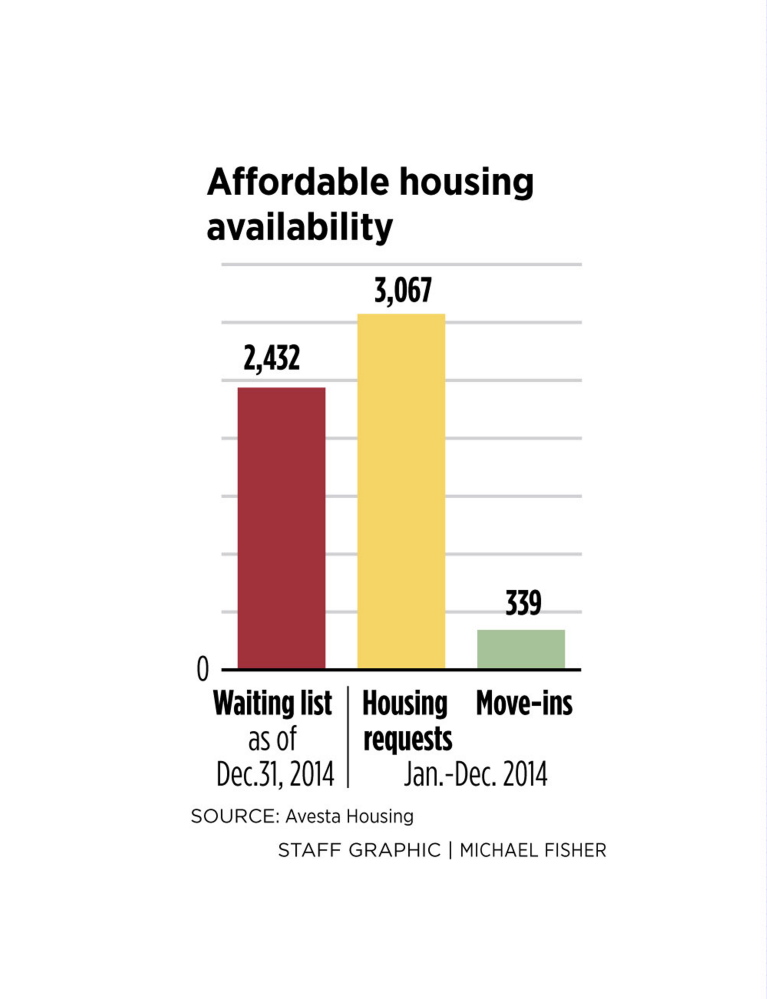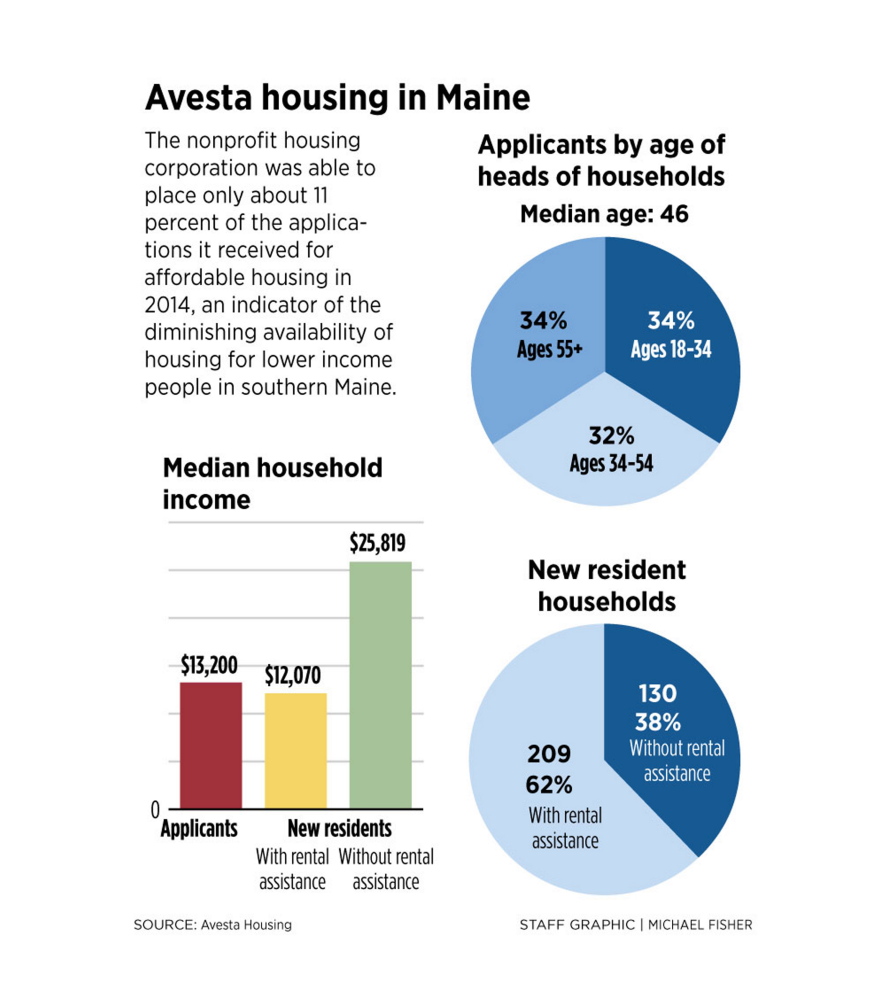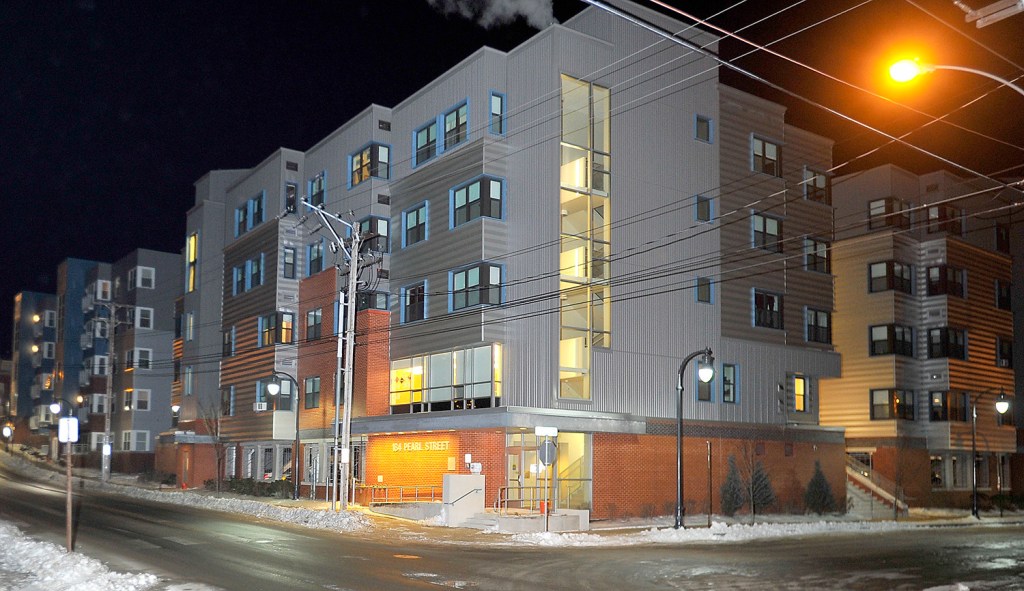In 2014, more than 3,000 households asked Avesta Housing for help in their search for an apartment they could afford.
Some were families living in apartments they couldn’t afford. Some were single parents hoping to find a place for themselves and their children. Some were people looking to move out of homeless shelters.
Avesta is inundated with requests like these, but in 2014 could only help 339 households find affordable housing. As of Dec. 31, its waiting list had 2,432 households, which could mean anything from an individual to a large family.
The nonprofit’s 11 percent success rate is not from a lack of trying. It’s a symptom of a severe dearth of housing in southern Maine, according to Dana Totman, Avesta’s CEO.
Another glaring sign of the housing crunch can seen in the Section 8 voucher program administered by the Portland Housing Authority. Only 40 percent of the households that received the housing subsidy in 2014 were able to find an appropriate place to live, compared with more than 80 percent who succeeded in the two previous years.
Avesta manages 1,900 apartments at 70 properties, the majority in York and Cumberland counties. That makes it one of the largest providers of affordable housing in northern New England. So, while its data doesn’t offer a comprehensive look at southern Maine’s affordable housing market, it does provide a snapshot of its challenges.
‘WE … HEAR IT EVERY DAY’
Totman wasn’t surprised by his organization’s year-end report. He knew the problem was worsening just from the volume of people visiting and calling the office.
“We see it and hear it every day,” Totman said Thursday. “We hear the desperation in their voices and the desperation about where they’re currently staying, and that’s what is very sobering in the work we do every day.”
The Portland Housing Authority, which manages 995 affordable housing units in Portland, reports similar constraints in helping people who are searching for affordable housing. In 2014, roughly 1,200 households applied to the authority for assistance, according to Mark Adelson, the housing authority’s executive director. Turnover among existing residents was low, so it could only help 100 applicants find a home at one of its properties, which includes Franklin Towers and Kennedy Park among others. It currently has 1,406 households on its waiting list, Adelson said.
“The point of affordable housing is to supply the opportunity of success for these households, and that’s really in jeopardy when people don’t have affordable housing,” he said.
Besides the housing units it owns and manages, the Portland Housing Authority also has roughly 1,500 tenant-based Section 8 vouchers (different from vouchers that are tied to specific apartments) that provide a subsidy for individuals and families to find affordable housing. Roughly 150 of those vouchers became available during 2014. Of the households that received vouchers, only 40 percent have been able to find an apartment and landlord willing to accept them, according to Adelson. In 2013, the success rate was 84.5 percent. In 2012, it was 80 percent.
A vacancy rate in the city that’s roughly zero “has actually cut our success rate in half,” Adelson said.
“Portland is a very attractive urban area in an attractive state and we make lots of lists of ‘most popular,’ ‘the nicest’ and ‘the healthiest’ and there’s not enough housing to accommodate everybody,” he said.
The result of a hot market for apartments is that the number available for affordable housing shrinks as landlords decide they don’t need to take housing vouchers and could do better by posting rentals online. Or the market suddenly looks right to convert an apartment to a condo, or to an online tourist rental.
“There’s activity going on in a number of places,” Totman said. “All of which hurts and none of which helps.”
The simple answer is the city and surrounding area need more housing units – both affordable and market rate. Avesta opened two new properties in southern Maine in 2014 and there are several developments under construction. New market-rate apartments, like the several hundred proposed in the ‘midtown’ project in the Bayside neighborhood, will help by taking pressure off other housing stock and temper the increases in rental rates.
Currently, an average hourly wage of $19.46 is needed in the Portland metropolitan area to afford a two-bedroom apartment with a fair market rent of $1,012 a month, according to the National Low Income Housing Coalition. The state as a whole places No. 25 on the coalition’s national housing affordability index.
WIDER IMPLICATIONS
A lack of affordable housing has wider implications for the community, Totman and Adelson say.
For instance, Totman poses hypothetical questions: If two families are doubled up in a small apartment, will the kids perform well in school? If a family pays more than 50 percent of their income on housing, will the kids eat healthy? If people are stuck in a homeless shelter, can they be looking for a job when they don’t have an address?
“It contributes to other social assistance costs and it prevents in many cases some level of greater economic security and independence,” Totman said. “The cost of having people living in inappropriate places has to be reckoned with.”
Most troubling for Totman is the $13,200 number – the median household income of the people asking Avesta for help. It’s shocking not because it’s dropped significantly, but because it hasn’t seemed to budge.
“Every time I see it and reckon with it, it feels more daunting than ever,” Totman said.
Send questions/comments to the editors.





Success. Please wait for the page to reload. If the page does not reload within 5 seconds, please refresh the page.
Enter your email and password to access comments.
Hi, to comment on stories you must . This profile is in addition to your subscription and website login.
Already have a commenting profile? .
Invalid username/password.
Please check your email to confirm and complete your registration.
Only subscribers are eligible to post comments. Please subscribe or login first for digital access. Here’s why.
Use the form below to reset your password. When you've submitted your account email, we will send an email with a reset code.